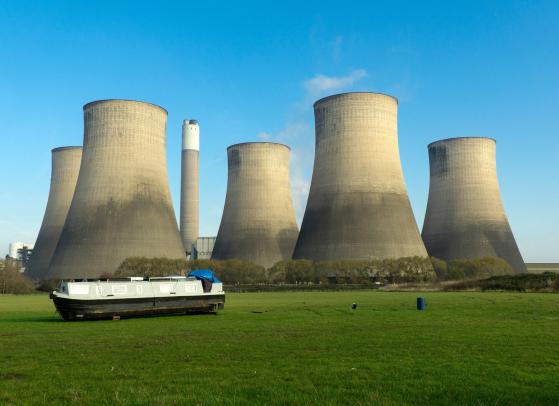Invezz.com - Britain’s last remaining coal-fired power plant at Ratcliffe-on-Soar in Nottinghamshire is set to generate electricity for the final time on Monday, after serving the UK for 57 years.
The closure of this facility represents a major milestone in the country’s journey to phase out coal, the most polluting fossil fuel, in line with government policies introduced nearly a decade ago.
The UK, the birthplace of coal power during the Industrial Revolution, is now set to become the first major economy to completely give up coal.
Minister for Energy Michael Shanks acknowledged the historical significance of the event, stating,
We owe generations a debt of gratitude as a country.
While the plant once employed 3,000 engineers, the workforce at Ratcliffe-on-Soar has dwindled to just 170 employees, who will remain on-site to assist with the decommissioning process, expected to last two years.
The plant’s closure comes after a series of delays, with initial plans to cease operations in late 2022 being postponed due to the Europe-wide gas crisis exacerbated by Russia’s invasion of Ukraine.
The plant’s owner, German energy company Uniper, reached an agreement with the government to keep Ratcliffe operational during this period, but with the situation now stabilizing, the closure is going ahead as planned.
A watershed moment in the UK’s energy history
The closure of the Ratcliffe-on-Soar plant has been hailed by environmental advocates as a critical achievement in reducing carbon emissions.
Green campaigners have praised this moment as a demonstration of international leadership on climate change, and a positive example of how to achieve a “just transition” for workers in the coal industry.
“It’s a really remarkable day,” said Lord Deben, the longest-serving environment secretary.
Britain built her whole strength on coal, that is the Industrial Revolution. Now, we’re leading the way by giving it up.
Jess Ralston, head of energy at the Energy and Climate Intelligence Unit (ECIU), shared her thoughts on the plant’s closure:
This is a British success story overseen by successive governments of different stripes. There were those who warned of blackouts as coal disappeared from the power system, but their predictions of doom have been proven wrong again and again.
How did the UK achieve a reduction in coal use in its energy supply?
In the early 1980s, coal power contributed to 80% of the UK’s electricity supply.
In 2008, the UK established its first legally binding climate targets, however, by 2012, coal still made up 40% of the power mix.
In 2015 the then-energy and climate change secretary, Amber Rudd, told the world the UK would be ending its use of coal power within the next decade.
Source: Statista
Accordingly, over the last decade, coal has been steadily replaced by cheaper and cleaner alternatives, such as renewables and natural gas.
The introduction of carbon taxes, coupled with the rise of wind and solar energy, has further driven the decline of coal.
Data from National Grid’s Electricity System Operator shows that coal accounted for just 1% of the UK’s electricity in 2023.
This trend is not unique to the UK. Across the Organisation for Economic Co-operation and Development (OECD), coal power has halved since peaking in 2007, with 27 of the 38 member states pledging to phase out coal by 2030.
Renewables, particularly wind and solar, now dominate the UK’s energy mix, accounting for more than half of its electricity generation.
Gas, once a secondary player, has also increased its share from 28% in 2012 to 34% last year.
The future of UK energy and challenges in reducing gas consumption
The UK government now faces the challenge of further reducing gas use as it strives to meet its net-zero electricity generation target by 2030.
Tony Bosworth, a campaigner with Friends of the Earth, emphasized the importance of moving beyond coal and gas:
The priority now is to move away from gas as well, by developing as fast as possible the UK’s huge homegrown renewable energy potential and delivering the economic boost that will bring. But this vital green transition must be fair, by protecting workers and benefiting communities.
The newly-elected Labour government has already taken steps to accelerate this transition, including the creation of a state-owned energy investment company, GB Energy, and lifting the ban on new onshore wind projects in England.
In September, the government awarded contracts for new wind and solar farms, which are expected to generate enough power for 11 million homes.
Energy Secretary Ed Miliband has made it clear that the shift to clean energy is not just about tackling the climate crisis but also about securing energy independence.
The gas price hikes following Russia’s invasion of Ukraine led to soaring consumer bills in 2022 and 2023, reinforcing the need for energy diversification.
Jess Ralston, head of Energy at the Energy and Climate Intelligence Unit (ECIU) said,
The British public have been burnt by over-reliance on gas for electricity and home heating during the ongoing gas price crisis. People are keen to see the shift to renewables, not only to reduce emissions but to stabilize energy prices too.
With the closure of Ratcliffe-on-Soar, Britain has reached a significant turning point in its energy transition, paving the way for a future powered by renewables.
This article first appeared on Invezz.com
